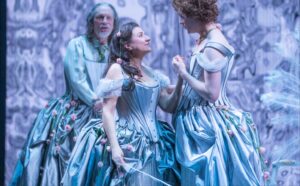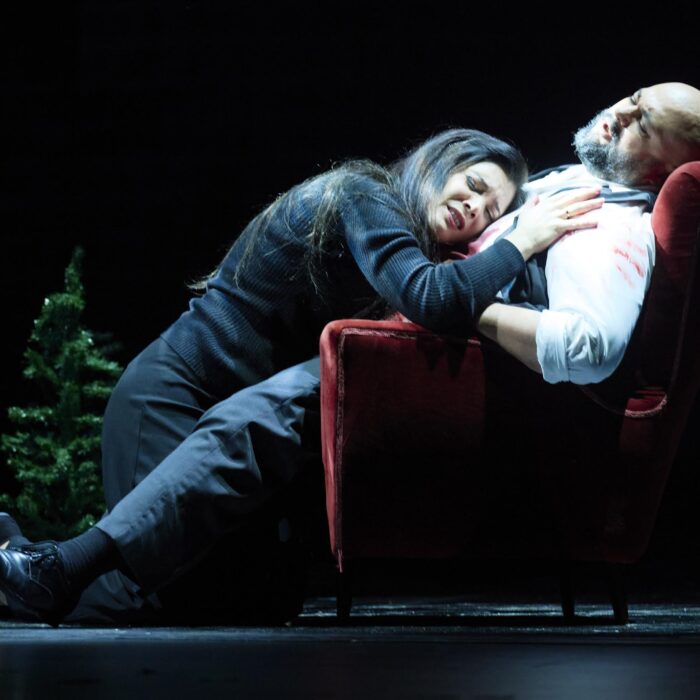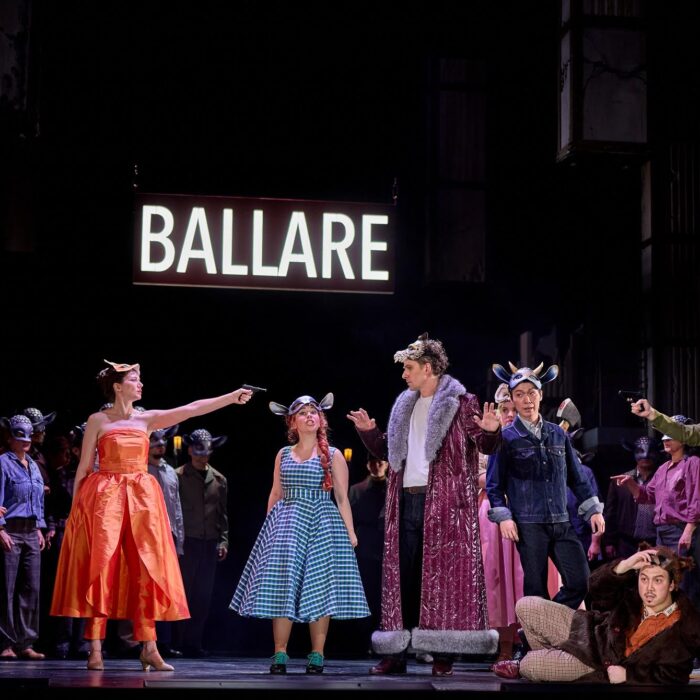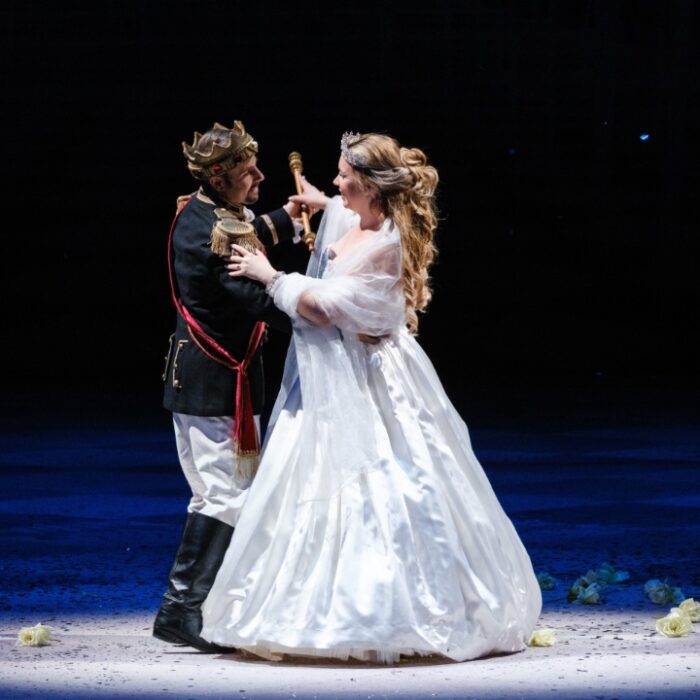
Opéra de Monte-Carlo 2024 Review: Their Master’s Voice
By Robert Adelson & Jacqueline LetzterPhoto: © OMC-Marco Borrelli
On Sunday April 7th, 2024, the Opéra de Monte-Carlo concluded their 2023-2024 season with the world premiere of “Their Master’s Voice,” starring mezzo-soprano Cecilia Bartoli and actor John Malkovich. The show was a coproduction with the annual music festival Le Printemps des Arts de Monte-Carlo, of which this performance was also the closing event. For voice aficionados, this festival offered its usual innovative programming, ranging from the Ensemble Gilles Binchois performing the Requiem by fifteenth-century composer Johannes Ockeghem to contralto Marie-Nicole Lemieux and tenor Pene Pati singing in Mahler’s “Das Lied von der Erde.” Just a few hours before “Their Master’s Voice” one could attend a concert by the Ensemble Clément Jannequin at the nearby Cathedral in Monaco in a sumptuous program of Renaissance polyphony.
A Modern Pasticcio
Billed as an “operatic spectacle,” “Their Master’s Voice” is an homage to the legendary castrato Farinelli (né Carlo Broschi, 1705-1782). The title is a reference to the relationship between Farinelli and his master Nicola Porpora (1686-1768), not only one of the leading composers of the baroque period, but also an influential pedagogue. The spectacle was the brainchild of Bartoli and Malkovich, who commissioned the text from playwright and stage director Michael Sturminger. Sturminger was the obvious choice for this work, as he is the author of a similar “chamber opera play” entitled “The Giacomo Variations” (2011), focusing on the lives of Giacomo Casanova and Lorenzo Da Ponte, in which Malkovich played the role of Casanova. After the performance in Monaco, “Their Master’s Voice” will be staged again on June 8th at the Opéra Royal de Versailles, and on July 10th in the Barocchissimo festival at the Wiener Staatsoper.
When the curtain opened, the audience saw the first rehearsals of a new show, conceived of by the fictional Jeffrey Himmelhoch (played by Malkovich), a retired American countertenor who had enjoyed fame in the 1980s and 1990s. The rehearsals are not going well, as Himmelhoch (literally “high heaven,” an apt name for a male soprano) complains about the working conditions in today’s opera houses and is in constant disagreement with the young stage director Rosie Blackwell (played by the actress Emily Cox), who is more interested in creating a spectacle around contemporary notions of gender identity.
A Gender Duel
Himmelhoch explains that years earlier he had discovered in an antiquarian bookshop in Madrid the unpublished manuscript memoirs of Farinelli, with whom he closely identifies. He decided to bring the memoirs to life by reviving the popular baroque practice of the pasticcio: an opera made up of arias by different composers, often excerpted from existing works. Himmelhoch invites the countertenor Lukas Dahlberg (played by the real-life countertenor Philipp Mathmann) to incarnate the young Farinelli but is desperate to find a mezzo-soprano with a high enough range to sing the most difficult arias composed for the mature castrato. The production is saved by the appearance of Maddalena Cigno, a cleaning lady with an incomparable voice, played by none other than Cecilia Bartoli.
Although “Their Master’s Voice” is subtitled “A Gender Duel”, it is more an exploration of the ways in which the lost voice of the castrato can be approximated differently by a countertenor or by a female soprano. The two approaches were contrasted in an inspired interpretive idea. In two arias (“Desterò dall’empia” from Handel’s “Amadigi di Gaula” and “Amami, e verdrai” from Steffani’s “Niobe, regina di Tebe”), Bartoli and Mathmann alternated the A and B sections of each aria, turning these solo numbers into highly original duets. Mathmann retained a light and boyish vocal timbre for the entire evening, providing a clear foil to Bartoli’s more sensual approach.
A Bartoli Show
Unfortunately, “Their Master’s Voice” did not display Bartoli and Malkovich to equal advantage. The spectacle was essentially a “Bartoli show”, beginning with a stunning performance of “Gelido in ogni vena” from Vivaldi’s “Farnace”, and continuing with arias from Steffani’s “Niobe, regina di Tebe” and Handel’s “Jephtha”, “Amadigi di Gaula”, “Orlando Furioso” and “Semele”. Bartoli concluded the selection of solo numbers with a memorable rendition of “Lascia la spina” from Handel’s “Il Trionfo del Tempo e del Disinganno”, sung in front of a giant red rose as the sole scenery.
Malkovich, on the other hand, was not as well served by Sturminger’s one-dimensional text. He struggled to find the proper dramatic timing, and most of the humor fell flat. The great surprise in his performance came at the end of the evening as Bartoli’s character of Maddalena bid farewell to Himmelhoch. She launched into the love duet “Pur ti miro” from Monteverdi’s “L’incoronazione di Poppea” and was joined by Malkovich singing the lower part, in his inimitable quivering voice made famous in countless film roles.
Conductor Gianluca Capuano led the period instrument orchestra Les Musiciens du Prince-Monaco in a lively accompaniment to this difficult program. Their performance was marked by impressive contributions by the instrumental soloists from the orchestra’s ranks who were featured in obbligato parts to various arias: Thibault Noally (violin) Thibaud Robinne (trumpet), Pier Luigi Fabretti (oboe), Jean-Marc Goujon (flute) and Elisa La Marca (theorbo).
Bartoli has not disappointed admirers of her singing since becoming Director of the Opéra de Monte-Carlo. She was featured in three of the eleven productions in the 2023-2024 season: in addition to “Their Master’s Voice,” she sang the role of Cleopatra in a new production of Handel’s “Giulio Cesare” and sang a solo recital with pianist Lang Lang. Audiences will certainly be eager for the announcement of the next season she has planned at the Opéra de Monte-Carlo.



